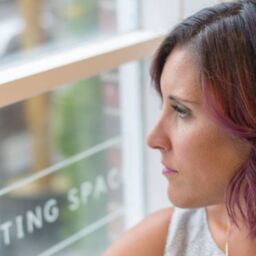
About the Podcast:
Everyone struggles with challenging relationships at times, be they romantic, familial, friend, or work. If you’re not happy with a relationship but you don’t want to leave it, what can you do?
In this episode, you’ll learn three concepts that can help you shift your perspective and improve any kind of relationship – even if the other person doesn’t change. You’ll also hear an important additional suggestion and caveat about improving relationships.
What You’ll Learn:
- What really defines a relationship
- Why two people can have vastly different experiences of the same relationship
- How to improve a relationship even if the other person doesn’t want to change
- Why most adults live in emotional childhood and how we can live in emotional adulthood instead
- Why you want to think on purpose about any relationship you want to continue and how you can do that
- How Newton’s First Law of Motion applies to relationships
- An important caveat about improving relationships
Featured in the Episode:
- How to leave a podcast rating and review: Apple Podcasts | Spotify
- Brooke Castillo
- Coach Certification Program at The Life Coach School
- Choose Your Own Adulthood: A Small Book About the Small Choices That Make the Biggest Difference by Hal Runkel (affiliate link)
- FREE Confidence Cheat Sheet
- Connect with me on Instagram and Facebook
Does any of this sound familiar?
- You’re a smart, accomplished woman with advanced degrees and certifications.
- You’re detail-oriented, and you pride yourself on doing quality work.
- You have years of experience and think you should feel confident in what you do.
Despite all of that:
- You feel insecure speaking up in meetings and presenting to others.
- You hold back sharing ideas or asking questions in meetings because you’re worried what others will think of you.
- You obsess over details and worry about getting everything “just right.”
- You find yourself constantly reviewing and tweaking your work to make it a little better.
- You feel anxious and stuck when you can’t get something “just right” or when you’re not sure what “just right” is.
If that sounds like you, I want you to know you’re not alone.
If you’d like to feel more confident in your career and personal life, my FREE Confidence Cheat Sheet can help. You’ll learn 3 simple steps to start feeling more confident today.
If you’d like even more help, sign up for a FREE confidence booster call with me. We’ll meet on Zoom, and in an hour or less, I’ll identify one of YOUR confidence blockers (it’s not the same for everyone), and I’ll tell you one thing you can do to fix it. Then, if you’re interested, I’ll share information about my one-on-one coaching program. Whether you sign up or not, you’ll leave the call knowing one thing you can do to feel more confident.
Confidence doesn’t come from degrees, certifications, accolades or experience. It’s a learnable skill, and I can teach you how to have it for the rest of your life.
Schedule a free confidence booster call to get started today.
Full Episode Transcript:
Welcome to the Perfectionist Professional Woman podcast. This is Episode 17, “How to Improve Your Relationships.”
I’m Keri Martinez. I’m a wife and mother of three children and three bonus children. I’m also a certified life coach and a member of the Church of Jesus Christ of Latter-day Saints. For a good portion of my life, I equated perfection with happiness and success. I thought that striving to be perfect and do things perfectly was the key to feeling happy and to being successful. I’ve since come to realize that perfection isn’t necessary to achieve either one of those–quite the opposite, in fact–and that has made such a difference in how I think, feel, and experience life. So if you’re a professional woman and you’d like to know how to release perfectionism so you can trade self-doubt for self-confidence, stop beating yourself up, and start enjoying your life more, then come with me. Let’s do this together.
Hello everybody. Welcome to this week’s episode. I hope you’re having an amazing day.
I have some really powerful things to teach you today that will help you improve your work relationships, family relationships, friend and neighbor relationships, basically all the relationships.
But before I get started with that, I’d like to make a small request. If you’re getting something out of these podcast episodes, please take a minute to leave a quick podcast rating and review. You may not realize it, but doing that will benefit both of us. It’ll benefit you because gratitude and kindness feel really good! It’ll benefit me because it’ll get my podcast in front of more people. And it’ll actually benefit a third party. As the algorithm does its thing and gets this podcast in front of more people, it’ll help women struggling with self-doubt and insecurity get some free help to feel better. So posting a rating and/or review would be a win-win-win!
Here’s a review that came in recently from “Disappointed in New Mexico.” She said, “I am a retired professional, working to be a retired professional perfectionist. I was introduced to the podcast by Keri Martinez as she began her coaching business. I have enjoyed and related to all the episodes I have listened to. She brings so many things to mind that I, like her, wish I would have known and questioned many years back. I appreciate that she introduces the fact that there is never a wrong time to begin questioning those things that our brain has taught us to believe from our early years. It is good, even great, for us to take the time to re-examine our beliefs about ourselves and our capabilities and allow ourselves the freedom of letting go of those we find are holding us back from being our best selves, of being our genuine selves. Keri has a delightful way of presenting each episode and topic and I look forward to following her.”
So thank you, “Disappointed in New Mexico!” That means a lot to me. I’d love to highlight more reviews, so if you’re willing to take the time to write one, I’d be happy to read it on the podcast.
OK. Let’s get back to how we can improve our relationships. I’m going to teach you three concepts you can use to improve your relationships. If you’ve been listening to other episodes, you’ll recall that what causes us to feel any emotion is our thoughts. So, if we’re feeling confident, it’s because of what we’re thinking. If we’re not feeling confident, it’s also because of what we’re thinking. If we’re feeling calm or anxious about a relationship with someone, it’s because of what we’re thinking about that relationship. Are you with me so far?
Building on that, the first thing I’m going to teach you is that any relationship with another person is just our thoughts about them. That’s what a relationship is at its most basic level – our thoughts about the other person. Whether we have a good relationship or bad or anything in between comes down to our thoughts about the other person. It’s not determined by their actions or lack of actions, their words, their physical proximity to you, the length of time you’ve known them, or how much you know about them. Does that seem kinda crazy?
I’m not saying those things can’t affect your relationship, because they can and usually do, but not in the way we tend to think. They affect your relationship by impacting what you think about the other person. If someone treated you kindly, for example, you’re probably going to have different thoughts about them than if they treated you rudely or were apathetic toward you, right? And as you learn more about someone, their likes and dislikes, their habits, their beliefs, and so on, that can also change your thoughts about them. We’ve probably all experienced situations where our impressions of people have changed as we’ve gotten to know them better. And physical proximity can affect our thoughts about a person because we often pick up more information about someone when we can observe them and their body language in person.
So, our relationship with another person is our thoughts about them. Because of that, two people can be in a relationship and have completely different experiences of that relationship. One person might think the relationship is solid and amazing and the other might think it’s stale and time to move on. Someone could be in a relationship with someone else and that other person could be completely unaware of it. People feel like they know celebrities because of what they see of them in movies or on social media. At the extreme end, this turns into delusional fantasies and stalking, but we could say that all relationships are somewhat delusional, because they’re all in our head. Relationships are not tangible things. They’re based on how we feel and act toward others, and those things all come from our thoughts.
Yes, I know this is a little trippy. This idea warped my brain when I first heard it, but the more I thought about it, the more it made sense, and the more I liked it. Truly understanding what a relationship is will set you free, because if our relationship with someone is simply our thoughts about them, we can change the relationship by changing our thoughts about it. We can improve the relationship by improving our thoughts about it. The other person doesn’t need to do anything, actually. And that’s the best news, because it puts us in the driver’s seat of all our relationships.
Now, the pushback I typically get here is that people think I’m saying we should think thoughts to feel good about every relationship, even if the other person is mistreating or abusing us, and that’s not what I’m saying at all. I’m not promoting a “lipstick on the pig” approach. If someone is mistreating or abusing me, I personally don’t want to think happy thoughts about that. I personally wouldn’t want to think we have a wonderful, loving relationship. But that’s the whole point – owning that I have the choice over what I want to think about it.
This brings up the second concept I want to teach you about and that is emotional childhood. Emotional childhood is believing we aren’t responsible for our own feelings. It’s believing that our feelings are caused by other people, by things outside of us. Things like how people talk to us or treat us. It’s believing that we need other people to behave a certain way for us to feel how we want to feel, be that happy, loving, calm, etc.
Emotional adulthood, on the other hand, is taking responsibility for our emotions. It’s acknowledging we have agency over our thoughts, regardless of how other people behave, so we have the capacity to manage our own emotions.
Now, if the term emotional childhood seems condescending or degrading, that’s not how I’m intending it. I’m not calling anyone out or saying it’s bad to be in emotional childhood. I’m simply pointing out it’s a thing, and you can decide what you want to do with this information.
When I was going through coach certification, my teacher, Brooke Castillo, talked about emotional childhood like this. She said if you think about children, they’re dependent, right? They depend on their parents to solve their emotions, so they cry when they’re hungry or hurt or uncomfortable. Children want and need something external to solve those emotions for them. As infants, toddlers, and young children, they are not capable of solving those emotions for themselves.
Then as they get older, this pattern continues, and they’re explicitly taught that external things cause their emotions. They’re taught this by people telling them that other kids hurt their feelings or that they hurt someone else’s feelings. Does this ring a bell for you like it does for me?
The problem with that is it creates dependence on other people to create our feelings of positivity, and it sets up or brains to blame them for our negative emotions. We’re then at the effect of the world and we end up feeling powerless.
Now, most adults operate in emotional childhood without even realizing it. If you see someone who appears upset and ask them why they feel that way, they’ll probably tell you it’s because this thing happened. They’re not going to tell you it’s because they’re thinking a particular thought or set of thoughts. They’ll say someone was rude to them or cut them off on the freeway, a friend didn’t respond to their text message or remember their birthday, their child disrespected them, their boss said they needed to work late, they got passed over for a promotion, and so on. We all do this, because we’ve all been conditioned to attribute our emotions to things outside of us.
But please don’t use this as an excuse to start shaming yourself. As I said, we all do it, and I’d much prefer you take what I call the Maya Angelou / Hal Runkel approach here. In case you don’t know who those people are, Maya Angelou is a well-known poet and Hal Runkel is a family therapist and author. Maya Angelou said, “Do the best you can until you know better. Then, when you know better, do better.” You probably weren’t even aware you were living in emotional childhood before, and you were doing the best you could with what you knew. No shame in that. Now that you know better, you can start doing better.
The Hal Runkel part of this comes from a book he wrote called Choose Your Own Adulthood. It is a pretty small book – it’s 146 pages, a very easy read, and I absolutely love it and would highly recommend it. Anyway, each chapter in the book is structured around two options – one more desirable and one less desirable. Hal’s premise is that you don’t need to do the more desirable option all the time. You don’t need to be “perfect” in choosing the better option. He just recommends striving to do more of one and less of the other. For example, he says you should respond more and react less, decide more and deliberate less, risk more and regret less. My spin here is to spend more time in emotional adulthood and less in emotional childhood. You don’t need to be perfect and be in emotional adulthood all the time – just start by trying to be in it a little more than before. That means spending a little more time recognizing what you’re thinking and how it’s creating your feelings, and a little less time blaming others for how you’re feeling.
Which brings me to the last concept I want to teach you about and that is thinking on purpose about your relationship. Way back in episode one, I said most of the thousands of thoughts we think each day are recycled. Some estimates are as high as 90-95%. We have thoughts about our relationships and often don’t even realize we’re thinking them. We’re like a fish swimming in water that’s not aware of the water. We are swimming in thoughts and aren’t consciously aware of it. We accept our thoughts as the truth of the world, and we don’t see them as optional, and unless something happens to interrupt or change our thoughts, we’ll continue thinking them day after day after day.
Thinking on purpose is looking for those default, recycled thoughts, examining them, and then determining what we want to do with them. It’s consciously deciding to either keep thinking them or to think something different. It’s choosing on purpose what we want to think. In terms of improving our relationships, thinking on purpose is examining what we think about the people we’re in relationship with and deciding whether or not to keep those thoughts.
So let’s look at how to do that. First, you want to identify what you’re currently thinking about the other person. Ask yourself, “What do I think about so-and-so?” What do you think about your boss, a particular coworker, your significant other, your child, or whoever? Write down whatever comes to mind and don’t try to filter or censor yourself here. If your brain wants to have a temper tantrum and say something childish, ridiculous, or mean, just let it. Get it out of your head and on paper. Remember, your thoughts about the other person are what constitute your relationship with them, so you want to be really clear about what you think about them if you want to improve your relationship.
Next, go through each statement you wrote down and consider if it’s positive or negative. You’ll know if it’s positive or negative by how you feel when you think it. Since we’re working on improving relationships, we’re going to focus only on the negative statements moving forward. So for each negative statement, you’re going to ask yourself four questions.
- Is it really and always true?
- How do I react, what happens, when I think it?
- Even if it’s true, is it serving me to think this? In other words, is it helping me to live my values, be my best self, and accomplish my goals to think this?
- Who would I be without this thought?
Let’s say I had these two negative thoughts about a coworker. First, she’s rude, and second, her work is often wrong or incomplete.
Now let’s answer the questions about those two thoughts.
- Is it really and always true that she’s rude? Well, if I’m honest, she’s not always rude. Sometimes she’s ok, and sometimes she’s even funny.
- How do I react, what happens, when I think she’s rude? Well, thinking about her being rude makes me feel irritated and resentful, and then I typically respond with something snarky or rude myself.
- Even if it’s true, is it serving me to think this? Hmmm, probably not. It doesn’t help me live up to the value I have of loving others, it doesn’t help me be my best self, and it doesn’t help me accomplish any goals, so no.
- Who would I be without this thought? Well, I would be happier and less irritated and resentful for sure!
OK. Let’s do the same thing with the second thought.
- Is it really and always true her work is often wrong or incomplete? OK, so the grammar is a bit wonky there, but yes, I could say it’s true that her work is often wrong or incomplete. Maybe I even have documentation of all the times in the past month I’ve had to correct or finish her work.
- How do I react, what happens, when I think this? Well, I feel irritated and resentful, and then I end up finishing or fixing her work.
- Even if it’s true, is it serving me to think this? Now, for this one, I might say yes, it is serving me because I have a value of providing high-quality work to our clients, and knowing her work is often wrong or incomplete motivates me to ensure it’s client ready. Or I might say no, it’s not serving me because it’s taking my focus off of my own work and making it more difficult for me to accomplish my career goals.
- Who would I be without this thought? Well, I’d be a lot less resentful and irritated. I’d have more mental space and energy because I would be less focused on someone else’s work.
Honestly considering these four questions will not only help you gain clarity and insight, it will also shift your brain out of judgment and into curiosity. From a problem-solving standpoint, an improvement standpoint, clarity and curiosity are much more useful than judgment and lack of awareness.
OK. The final step is, based on how you answered the previous questions, ask yourself, “Do I want to keep thinking this? If not, what do I want to think instead?” There are no right or wrong answers here or with any of the previous questions. Remember, you always get to choose what you want to think. If you want to work on the relationship, if you want it to continue, I suggest you look for other things that are also true that would feel better to focus on. Instead of thinking, “my coworker is rude,” you might choose to think something like, “she’s struggling, clearly” or “hurt people hurt people.” Instead of thinking, “my husband forgot my birthday and that means he doesn’t really care about me,” you could think, “well, he’s never been good at remembering dates, but I know he still loves me.” Instead of thinking, “my daughter doesn’t respect me,” you could think, “she must be going through some stuff right now. I wonder what that might be.”
In terms of improving relationships, I have one final suggestion to consider and one caveat. The suggestion is, sometimes the best way to improve a relationship is to end it. Improving does not always entail continuing the relationship, be it a marriage, a friendship, or a business relationship. Based on that suggestion, my caveat is don’t use these concepts against yourself. If you’re in any kind of relationship where you are being physically, emotionally, mentally, financially, spiritually, or sexually abused, don’t use these concepts to convince yourself to stay. One of Newton’s laws of motion is that an object in motion remains in motion unless it’s acted on by another force, and an abuser will typically keep abusing unless acted upon by another force. Sometimes that other force needs to be the ending of the relationship, but only you can know that for sure.
OK. Quick recap of the three concepts you can use to shift your thinking and improve your relationships.
- Relationships are your thoughts about the other person. Your thoughts can be shaped by external factors like the length of time you’ve known the other person, how much you know about the other person, how they act, and so on, but your thoughts about them are, like all thoughts, optional.
- Emotional childhood is relegating the responsibility for your emotions to other people and other external things, and emotional adulthood is taking responsibility for your own emotions.
- Thinking on purpose is examining your thoughts and consciously choosing what you want to think. It’s considering if your thoughts are serving you, and if not, choosing to think something else that will serve you better.
As you’re learning and practicing these concepts, remember the Maya Angelou / Hal Runkel approach. When you know better, do better (that’s the Maya Angelou part) and you can do better by doing a little more of something desirable and a little less of something less desirable (that’s the Hal Runkel part).
Thanks for listening to this episode of the Perfectionist Professional Woman podcast. To see show notes and a transcript, head over to kerimartinez.com/ podcast. That’s k-e-r-i-m-a-r-t-i-n-e-z dot com forward slash podcast.
If you know someone who could benefit from this episode, grab the link and share it with them. Help me spread a little inspiration and goodness in the world.
And if you’re a woman who’s struggling to feel confident in your career and home life because you’re doubting yourself and your ability to handle all the things, you need to sign up for a confidence booster session with me. Go to kerimartinez.com/schedule and pick a day and time that works for you. We’ll meet on Zoom, so you can do it in the comfort of your own home and in your PJs if you want. And in an hour or less, we’ll identify one of your unique confidence blockers and I’ll tell you how you can fix it. Then, if you’re interested and only if you’re interested, I’ll tell you how you can get more help through my one-on-one coaching program. If that sounds like you, go to kerimartinez.com/schedule and sign up for a confidence booster session with me. I do only five sessions a week, so you’ll want to book yours now before this week’s spots are gone.
Have an amazing week everybody. I’ll talk to you soon.















